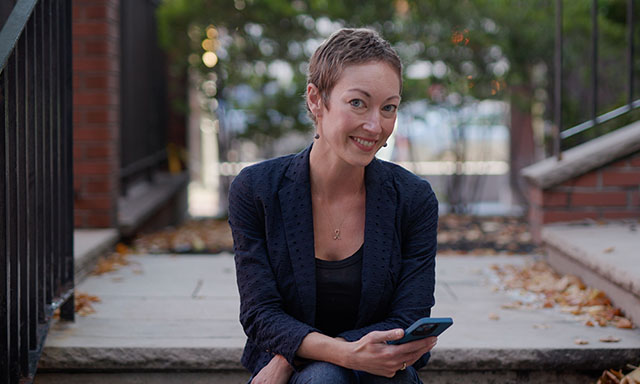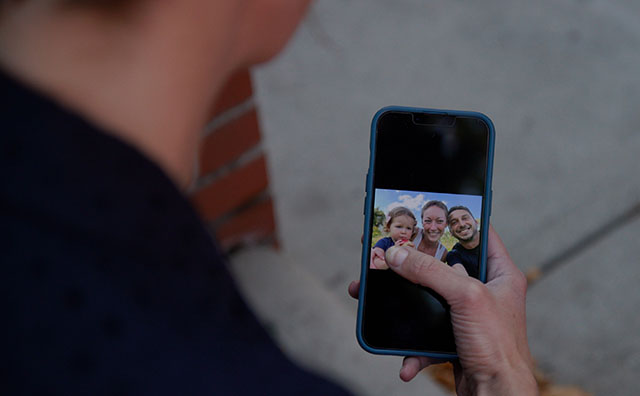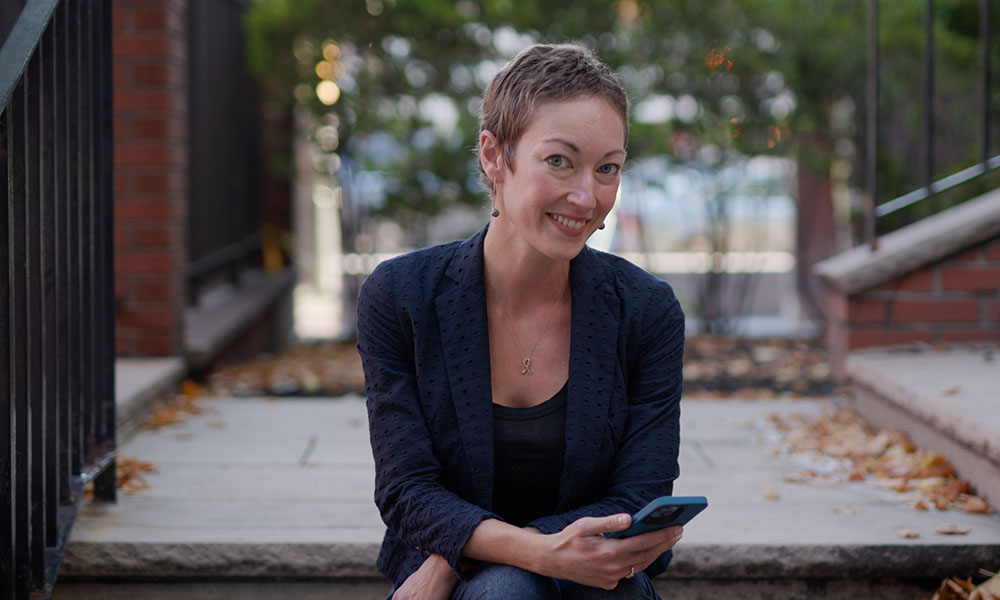Patient Story: Proton Therapy for Brain Tumor with Lindsay Strauss
Pregnant with her first child, Lindsay Strauss was diagnosed with a brain tumor and treated with proton therapy at Mass General Brigham Cancer Institute.
Weather AlertMass General Brigham's hospital campuses and off-site facilities are fully open and operational on Tuesday, Feb. 24, with the exception of some limited closures. For real-time updates and service changes, please check our Alerts page.View Alerts page
Patient StoryOct | 18 | 2022
I was diagnosed with stage 2 HER2-positive breast cancer on January 5th, 2022, when I was 39 years old. I am a mom of a little baby girl, she's going to be two in December, and I was weaning her off breastfeeding and thought I had a clogged duct and I thought "wow, this isn't going away." I did all the things you're supposed to do to make it go away and it just wasn't. A couple weeks before Christmas I talked to my mom about it, who recently survived stage zero breast cancer. She told me to just keep an eye on it and we'll see what happens, but it got bigger and got worse. The day after Christmas I called my doctor, and he said let's check it out.
I went in the day after Christmas. I got a biopsy to just rule out the scary stuff. I went to the appointment by myself because I thought "oh, it's nothing. I'm good.” You know? So, I'm sitting in the bathroom crying, the first thing you think of is "I'm going to die." What about my daughter, what about my husband? I just thought about my family. I can't leave them. I'm not ready. This isn't okay. You think the worst. I didn't know my diagnosis. So, I had to ring in the New Year with that behind me.
They called me January 5th and told me it’s cancer, stage two. You're going to need chemo, surgery, and radiation. I'll never forget it. I was sitting on the couch when I got the message. I saw cancer, I saw HER2-positive. It's four o'clock in the afternoon, my little girl just woke up from a nap, she's crying and I'm just on the couch inconsolable. I couldn't move. My husband consoled me, he told me it was going to be okay. I got my baby girl and thought, ”Nope, we're going to fight this.” And so, an hour later, I spoke to the doctor, he told me the prognosis. I decided, "You know what, I want to go to MGH." I called the person that took care of my mother and my grandmother, who also had breast cancer, and I got an appointment. A week later I was there speaking with four doctors for four hours, talking about my prognosis, my treatment plan, and what to expect. I was in chemo two weeks later. It was so scary. And the things that go through your head are just unimaginable... feelings you never thought you would have.

At first I asked, “why me?” I'm super healthy, I do fitness and wellness for a living. I've studied it. I eat right, I exercise every day, I sleep, I practice good mental health. I do all the things. I was really struggling with that, because I'm a huge advocate for health. And I sometimes annoyingly bother my family and friends, I'm like, eat this not that. Or make sure you exercise or make sure you're getting good sleep and drinking enough water. Now I'm the one that's sick. How is this possible? I really struggled with “how did this happen to me? What did I do wrong?” My doctor, Dr. Kuter said it doesn't run in your family, you don't have the genes, it’s not hereditary. It was really hard to get that diagnosis and not think you did something wrong. I think the hurdles are fear of now that I'm a survivor will it come back? It's always on my brain. I'm actively seeing a social worker here at the hospital and going to see a therapist at the hospital for it. And I'm proud to say it because it is something that every survivor probably struggles with, and maybe pushes it aside, but it's real. And I don't want to live with that fear forever. I know it's always going to be there, but I don't want it to run my life.
It was hard going through treatments with a baby. I still had to be a mom. It was a hurdle, but it was a blessing. My daughter's name is Sage and she kept me present. She didn't know what was going on, she was just asking “Mama play with me, read me a book, play with me on the floor.” And I still got to do that. As terrible as I felt during treatments or anything, she was my constant. She was my present, she kept me going. So as hard as it was to parent while going through cancer treatments, it was also a blessing in disguise I'd say. I got so much out of it. So at first with cancer, I did say, why me and now I'm saying why not me? Because I want to be an advocate. I didn't know I had a bump, I had no idea. Early detection is so important, and I constantly say my daughter saved my life because if I wasn't breastfeeding maybe I wouldn't have noticed. I learned so much about myself, about my life, about everything. I never took life for granted, but now I really look at life in a different lens. And I cleaned it up, I got rid of toxicity, things that I was holding on to because I felt like I should, people I was holding on to because I felt like I should, relationships that were one-sided. Things that no longer brought me joy or no longer helped me grow. I really think that it helped me grow as an individual. I take care of myself more. I listen to my body- What does it need? What does it need mentally? What does it need physically? Do I need to be alone? Do I need to be with people? I'm able to say no easier and without guilt.
A huge hurdle during cancer was COVID, you're already immunocompromised as it is. I had to deal with having a baby during COVID, being pregnant during COVID, and then I had to deal with cancer during COVID. It brought me a lot of social anxiety. It brought me a lot of anxiety in general having to ask people to test every time they saw me and ask where have you been. And I hated doing that, because I felt like I was judging them, friends and family, but they were more than happy to accommodate. It was a fear of if I get sick, what is that going to do to my treatment plan? We had to take extra precautions. We had to change our holiday plans, it was a lot, it was hard, it was really hard. But again, I learned so much from going through this. And one of the biggest things is you just never know what life is going to bring you. I had a clear path and it completely got derailed. And it's a form of acceptance that I must consistently deal with, acclimate and accept. But it's also a chance for me to start over with a clean slate. This is your new life, you got a second chance, how lucky are you? Not everyone gets that second chance, so I feel grateful for the life that I have, and the simplicity of it. I know the saying “stop and smell the roses” is cliche, but it is so true. I'm so much more present, I go to the park with my daughter and I'm not on my phone, I'm looking at the trees, I see the squirrels in the trees. I've never heard what a squirrel sounded like, and I've never been more present in my life. It just makes the world such a more beautiful place amongst all the chaos. People think I'm crazy. How on earth are you grateful for cancer, it's the worst thing in the world? I would never want it again and I would never wish it upon anybody. But it really did change my life. And changed it for the better.
As far as being an advocate for breast cancer and self-care, I've always been an advocate for self-care. That's kind of where my social media is and who I am as a person, I just want to take care of people. I feel like my purpose in life is to take care of people and help people, and that's kind of where I am. It definitely made me think about life differently. It's a fear that I'm always going to have but I choose to share my story in depth because I want people to know that it's really important to get checked. I personally think women should get mammograms way earlier than 40. I think early detection is key. And I really wanted people to understand the journey and to really enhance the power of positivity, because I think my attitude helped me a ton. I'm very lucky that I started with a healthy base as far as my physical health went, and my doctors told me Melissa, you're in really good shape, you're going to recover faster because you already know how to eat healthy, you already exercise, you already sleep well, you already practice good mental health... but cancer challenges all of that. There were days I did not want to get up from the couch, there were days where I did not care if I ate or not, or I didn't want to drink water because all I could taste was metallic. It was terrible but I forced myself because I had to take care of myself, for my family, for my daughter, for my husband. And so, I decided to share my journey on social media and with my friends and family to say, hey, self-care is so important, and your mental health is so important. I want to share my journey with you to inspire you to take care of yourself. It's never too late to take care of yourself. I want to inspire people...those tiny moments are the biggest things. That's what matters. It's the smile on your daughter's face, not the new boots you got, it's the people in your home, not how big your home is, it's all of those little things that become the big things. I think COVID taught me that, and cancer really exemplified it.
I'm trying to be an advocate for my daughter. I decided to keep a diary of my experience, and I write to her. It's a journal and every entry I say, “My Dearest Sage, My Dear Sage” and I write to her about what I'm going through, and my fears and my joys and my accomplishments. Even on a day where I'm like, man you made today hard I write to her, because someday I'm going to give this to her and say, you have my genes, you are strong just like me. So, this journal is her strength, and I'm keeping it for her. And it helps me, talking about it, journaling about it helps my mental health. I've tried to take a couple of different paths in how I advocate for cancer in general and surviving and being a survivor and living your life to the fullest. You never know when those curveballs are going to hit, and when they do, it's important that you are resilient enough to bounce back, because otherwise it'll hurt. It'll be hard.

I have an amazing support system. I feel so lucky and so blessed to have so many people in my corner. I have a beautiful family. My amazing husband and my daughter, my sister lives close by, she's been my everything. My mom and dad, they've all been just so crucial to my healing. I have a very close-knit family. So the calls, the texts, and all of that has been amazing. My friends are my family, they really are. So, I'm so lucky to have a very close-knit group of friends that have been amazing by just calling me, dropping off meals, flowers, scarves, anything to make me feel better and just constantly checking in on me. It was crucial to my healing, and I never ever felt alone. Even on my darkest days, I never felt alone because whether it was something I was wearing, or it was a text from a friend or a family member, or a picture, I knew someone was thinking about me and it made me feel at peace. My care team is phenomenal. I loved my nurses. They're fantastic. They've been there, just their bedside manner is amazing, asking how I'm doing. They remember my daughter's name; they take the time to remember those small things. I don't just feel like a number or a patient. I am Melissa to them. Any question I've ever had they are so quick on getting back to me. I don't feel like any questions are stupid, even though some feel silly. They're very serious about what they do. And I appreciate it from oncology, to chemo, to my surgeons, to radiation to the social workers I work with. And all the nurses. They've been phenomenal. I'm so grateful that I took this into my own hands and said I'm going to Mass General Brigham Cancer Institute, this is where I want to be. I'm grateful for it all.
I was lucky enough to be able to participate in a study for proton therapy. I was part of a study where either I got it or I didn't, and I was lucky enough to be able to receive it. I loved the extra care. I did echocardiograms, blood work, all sorts of different things that just made sure I was healthy and safe, which I really appreciated. To be honest with you, [The Burr Proton Center] is the most relaxing basement I've ever been. I'm in the basement [of the Hospital], but it's very relaxing here. They make it calm for a stressful situation, which I really appreciate. The nurses were some of my favorite people. They were fantastic. Some of them follow me on social media now. I’ve hosted charity exercise classes and some of the nurses have come. I appreciate the above and beyond relationship that they try to form with people.
I think “strength.” You must be strong to go through it, and if you let it, it can bring you down. Regardless of what treatments you're receiving, whether you get chemo or not, hearing you have cancer can break you. I was rocked when I got that news. You have a choice, you can say "this is going to kill me, or I'm going to fight this with everything that I have. So, when I think cancer, I think of strength.
It's something you just never expect to happen to you. It's like getting hit by a car. It's a journey but I'm grateful for it. And I think my life will be fuller because of it. And I've always had a full life. I've always appreciated my life, I'm a positive person but this just took it to a new level. And I feel like, at the end of my life, I can say man, I lived it. With what I went through so much was taken away from me. I lost a lot of dignity, I lost my hair, my identity, I lost my breasts, but I gained so much more. You realize those things don't matter after a while because you know the hair will grow back, and your physical appearance doesn't really matter when you get to live another day.
Melissa DupuisNow that I'm a survivor will it come back? I'm actively seeing a social worker and a therapist at the hospital... and I'm proud to say it. It is something that every survivor probably struggles with, and maybe pushes it aside, but it's real. And I don't want to live with that fear forever…I don't want it to run my life.
This interview was conducted in October 2022 and has been edited for clarity.
View inspiring cancer survivor stories from Mass General Brigham Cancer Institute’s community of patients, families, and staff.
Pregnant with her first child, Lindsay Strauss was diagnosed with a brain tumor and treated with proton therapy at Mass General Brigham Cancer Institute.
Mass General Cancer Center patient Tiffany Hogan shares in her own words how the PAVING the Path to Wellness program supported her through breast cancer treatment.
An integral part of one of the world’s most distinguished academic medical centers, Mass General Brigham Cancer Institute is among the leading cancer care providers in the United States.
